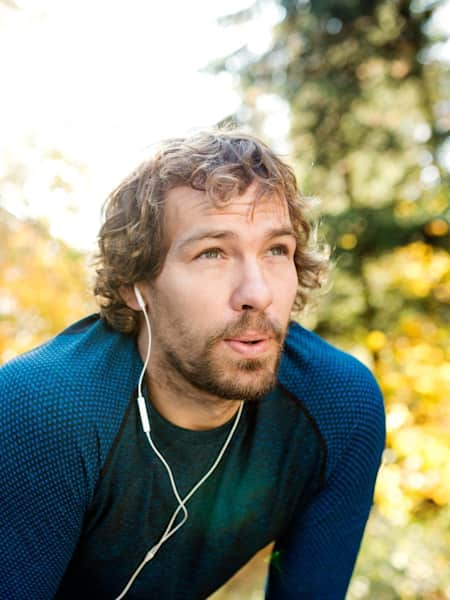The 11th edition of the Wings for Life World Run will take place on Sunday, May 5, 2024. For registration updates, complete global results and unforgettable highlights: visit www.wingsforlifeworldrun.com and download the new Wings for Life World Run App for iOS or Android.
Listen carefully. Do you hear that? It's happening in your chest right now. Breathing is everything – it's something we do to survive, something we do every single day, and yet most of us ignore it, when focusing on it could boost your physical and mental levels exponentially. Luckily, sport can help show us the way...
Research carried out by two scientists in 1983 found that runners who breathed in time with their stride had the highest level of performance. More recently, in 2011, a major study at the University of Portsmouth tested 12 runners over a six-week period and discovered that athletes who included breathing exercises as part of their training improved their times by 5-12 per cent.
But it’s not only breathing during sport that can help make you more focused and fitter. Practising breathing techniques in the run up to an event, race or, heck, a 5-a-side match, can help counter anxiety, insomnia and other factors, giving you a real edge on the big day.
Here are some breathing techniques which you can incorporate into your daily life for enhanced performances in sport…
First, take a minute to focus on your own breathing
Breathe in for a few seconds. Now exhale for the same amount of time. If this feels odd then you may need to get used to it, because the most common form of ineffective breathing is called ‘chronic shallow’ breathing, where we draw minimal breath into the lungs due to breathing in through the chest instead of the diaphragm, that large muscle located between the chest and abdomen.
Shallow breathing can be caused by many factors, including posture, stress, anxiety and physical restriction. Shallow breathing tricks our bodies into feeling stressed and therefore the longer we do it then the more we create a physiological stress response.
In the long term this can cause physical problems such as a lowered immune system and breathing problems. It can also lead to physical tension in our neck, shoulders and chest which can also negatively impact our posture and sports performance. So here's what to do:
Diaphragmatic Breathing (AKA deep belly breathing)
The opposite to shallow breathing, diaphragmatic breathing is the type of breathing that babies do naturally where their bellies rise and fall with each breath. This is completely different to adults, who for the most part breathe entirely in the upper portion of their trunk.
Diaphragmatic breathing has a host of benefits for the body and mind. Most importantly, it activates our parasympathetic nervous system which is our body's rest and digestive mechanism. It conserves energy, slows the heart rate and generally relaxes us. It also strengthens immunity, improves circulation, digestion and increases vigour. From a psychological perspective, diaphragmatic breathing also helps us to feel grounded, calm and focused. Basically, it's a one-way ticket to Chill Town, population: you.
How to do it:
Sit upright in a chair with your back supported or on the floor with your knees bent. Close your eyes and focus in on your breath, ensuring your shoulders draw away from your ears. Place one hand below your bellybutton and the other on your chest. Breathe in deeply through your nose and allow your abdomen to rise like a balloon being filled. Notice the bottom hand rising and falling with your breath and exhale, slowly allowing your belly to deflate. Repeat for 5-10 minutes.
You can also try it lying on the floor with your feet pushed up against a wall. The more you practise diaphragmatic breathing, the more natural it will become.
Benefits:
- Relaxes and restores the body
- Boosts the immune system
- Improves circulation
- Calms the nervous system
- Increases breath capacity
When to do it:
- Before training as part of your warm-up
- Ahead of a big event, match or run
- During times of stress and when you want to feel calmer
- When feeling physical tension in the body
And here are a few more breathing techniques that could boost your game:
Long exhale breathing
How to do it:
Lay on your back with your knees bent and your feet flat. Place one hand on your abdomen and take a few relaxed breaths. Lengthen out the inhalation and exhalation until they're of equal length and progressively increase the length of your exhale until you have a 1:2 ratio. Continue for 5-10 minutes.
If you've just had a big blow out run and the icy cold wind is making it hard to breathe, use the same long exhale technique to regain control of your breathing and give yourself a better chance to recharge your stamina.
Benefits:
- Reduces anxiety
- Helps you get better sleep
When to do it:
- When you can't sleep
- Any anxious moments
- The night before a big race or competition
Bhramari (humming bee) breathing
How to do it:
Breathe through both nostrils, keeping your lips closed. Inhale silently and then exhale making a humming sound (like a bee). Allow your lips and face to vibrate with your exhales. If you want to level this exercise up, cover your ears and eyes with your fingers for the ultimate sensory withdrawal! Continue for as long as you like up to half an hour.
Benefits:
- Relieves stress, anxiety and insomnia
- Calming and grounding
- Enhances memory and concentration
- Soothes the throat ahead of outdoor exercise
When to do it:
- The morning/afternoon before a race, event or match
- When you're feeling anxious, jittery or stressed
- Or suffering from a cold, sore throat or nasal congestion
- When you need to focus







